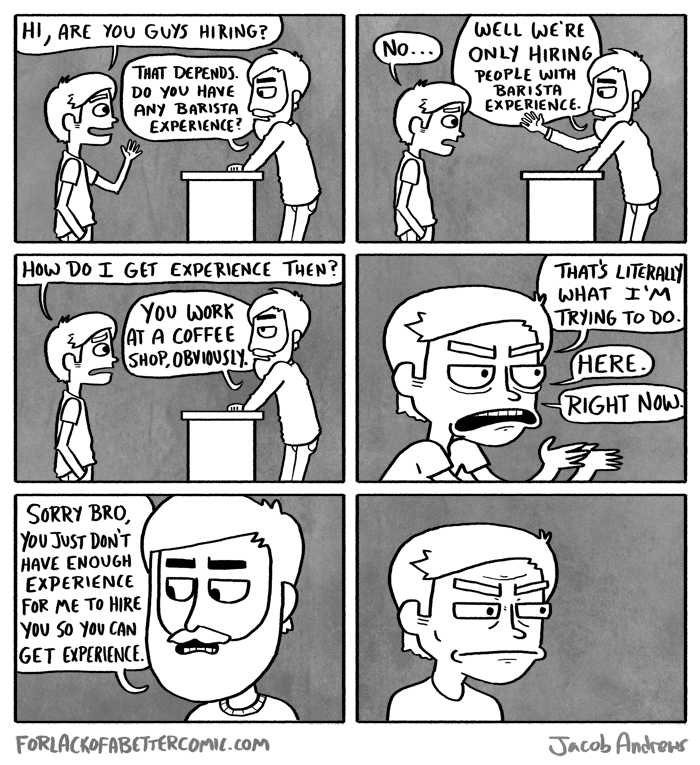What do you do when you’re starting out? What do you do when you’re switching industries, or rejoining the workforce? While every situation is different, many companies are looking for people with experience. Here are a few ideas for students, professionals switching industries or those rejoining the workforce:
Students leaving the nest
- If you are a current student or a recent grad, you may have a few advantages…
- Internships are usually reserved for students or recent grads. If you are a junior, senior or just graduated, you may have a very good chance at scoring an internship that will essentially be a business school education and your base for an entry level position. Look for an area and companies that interest you and apply/network like crazy. When you land said internship, be a sponge. Soak up everything you see, hear, habits that successful people have and the way that successful people carry themselves. Take notes, ask questions and at the end of it, you will have a lot to add to a resume.
- Clubs and projects are a part of the everyday. You can gain “ideal world” experience that may not be what you actually do in the “real world”; however, the project management skills, planning and presentation experience you gain are invaluable.
- Networking opportunities are constantly made available. Talk with your peers, professors and guest speakers about their ambitions, where they had success, mistakes they made or tips on how to be successful are all information that you will need. These people may also help you land a job or internship.
- College centers can help you market yourself! Never be afraid to go to your college center and have them format your resume, give you interviewing tips or a heads up on volunteer or internship opportunities. It’s their job to help you find opportunities for employment; use them.
Changing Industries with Work Experience
- Assess the pros and cons: The New York Times quoted John A. Challenger, CEO of Challenger, Gray & Christmas, who suggests, “For mid-career people, it’s risky to make a wholesale career switch. Unless they are at the beginning of their working lives, many people can’t afford to give up the time and the income required to develop entirely new skills.” If this description fits you, then applying your learned skills to a new industry may be the most economical and fulfilling choice.
- Research and compare your skills to those of your potential colleagues. Robert Hawthorne, president of search firm Hawthorne Research suggests, “Compare your accomplishments and skills to someone in a similar job who has been working in the industry you’re targeting. That will give you a better read on your chances and help you figure out how to position yourself against incumbents.” This can also help you see the way that industry experts talk about their skills and experiences. You can catalogue your existing skills, and find where you may need more research or experience.
- Network, network, network! Do research, learn the lingo, see any forecasts for successes or challenges in the industry and then hit the networking circuit. Attend events that are either industry specific or position specific, listen, learn and ask questions. The people you meet here may be able to help you directly, or know someone who has employment needs. If getting a job is about who you know, then go out there and meet people.
Re-Entering the workforce
Stay-at-home parents, those coming off of extended sick leave, or those coming out of retirement please do not get discouraged. Any volunteering during your time off and past work experience (years ago), can be relevant if you are able to present them in a way that shows you are keeping up with your industry. Our resident interview expert, Karen Melvin, had insight as to how a company may look at an extended leave candidate’s experience:
“First and foremost, if you have been on extended leave you may want to research companies who value a work/life balance. Those are the kinds of companies that are more likely to keep an open mind about extended leave, as opposed to companies that view employees as a number. Before interviewing I would suggest researching the industry to show that you are up on trends, review your resume to refresh your memory about how you acted/ re-acted in certain situations and network to find out any inside industry knowledge.”
As a last resort, or if you are seriously wanting to not only re-enter the workforce, but switch industries and/ or professions altogether, you may want to look into going back to grad school or college. Remember what Christopher Robin said, “You are braver than you believe, stronger than you seem, and smarter than you think.” You can do it!


